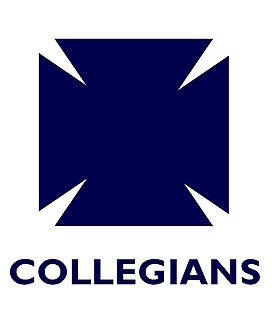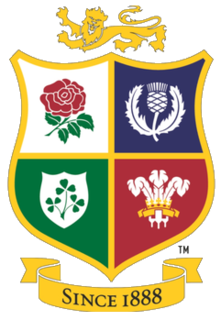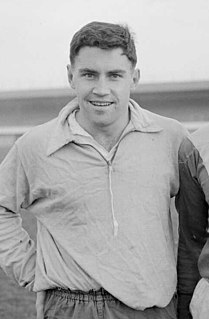Roger Michael Young (born 29 June 1943) [1] is a former Ireland and British Lions International rugby union player. [2]

Rugby union, commonly known in most of the world simply as rugby, is a contact team sport which originated in England in the first half of the 19th century. One of the two codes of rugby football, it is based on running with the ball in hand. In its most common form, a game is between two teams of 15 players using an oval-shaped ball on a rectangular field with H-shaped goalposts on each try line.
He was capped twenty-six times as a scrum-half for Ireland between 1965 and 1971 and scored one try for Ireland against Scotland [3] in 1965. [4]
Young was selected for the 1966 British Lions tour to Australia and New Zealand and played two internationals against Australia and one against New Zealand. He also went on the 1968 British Lions tour to South Africa and played in one international against South Africa.
In 1966 the British Lions toured Australia and New Zealand. The Lions won the two test matches against Australia but lost all four internationals against the All Blacks.

The Australia national rugby union team, nicknamed the Wallabies, is controlled by Rugby Australia. The team first played at Sydney in 1899, winning their first test match against the touring British Isles team.
In 1968 the British Lions toured South Africa. The tour was not success in terms of international results, the Lions losing the Test series against South Africa by three matches to nil, with the other match drawn. The Lions won 15 of their 16 non-international matches, losing only to Transvaal. The touring party was captained by Tom Kiernan, coached by Ronnie Dawson and managed by David Brooks. Star back Barry John broke his collar bone in a dangerous tackle in the first Test.
Educated at Methodist College Belfast, he played club rugby for Queen's University R.F.C. and Collegians.

Methodist College Belfast (MCB), locally known as Methody, is a Northern Irish coeducational voluntary grammar school in Belfast, located at the foot of the Malone Road. It was founded in 1865 by the Methodist Church in Ireland and is one of eight Northern Irish schools represented on the Headmasters' and Headmistresses' Conference. It is also a member of the Independent Schools Council and the Governing Bodies Association.

Collegians was a sports club for former pupils of Methodist College Belfast. In the 109-year history of the club, it had rugby union, cricket, hockey, basketball and athletics sections. The cricket section merged with Cooke Cricket Club in 1998 to form Cooke Collegians, and the remainder of the club is now called Belfast Harlequins after a merger with the North of Ireland Football Club in 1999.




